How to Find Trending Products to Sell on Amazon: A Guide
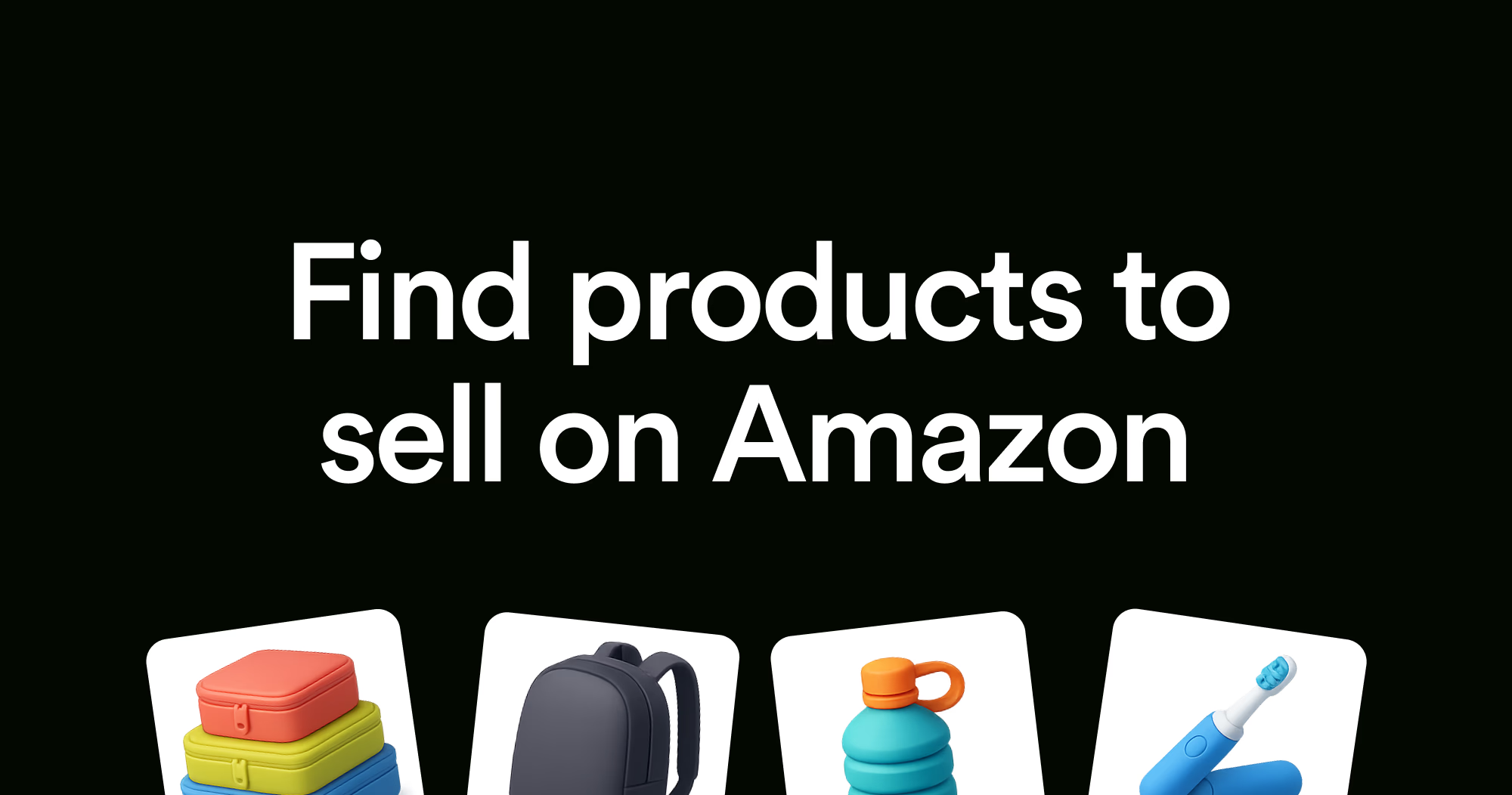
While most Amazon sellers chase yesterday's bestsellers, the real money gets made by those who spot tomorrow's trends early. Here's the uncomfortable truth. By the time a product appears in Amazon's "Hot New Releases," you're already too late.
The sellers making six figures aren't reacting to trends. They're predicting them using data patterns that most people completely ignore.
Learn how to find trending products to sell on Amazon with us.
Why Finding Trending Products is Your Key to Amazon Success
Amazon FBA is often described as a simple process. Pick a product, send it to a warehouse, and watch sales grow. But the reality is different.
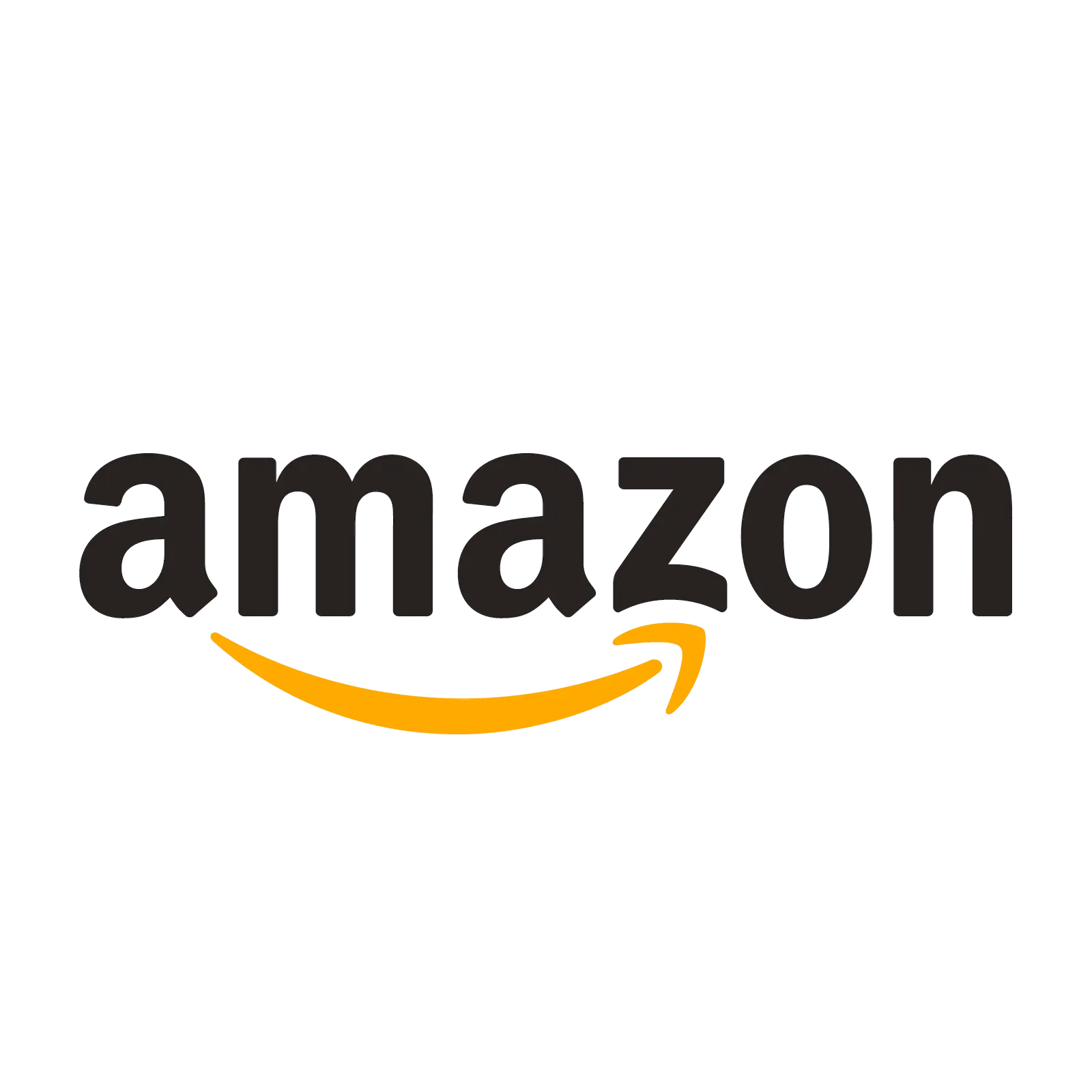
You compete on a global scale, and most obvious opportunities are already taken. Many sellers get stuck fighting over crowded niches. The real advantage comes from spotting the next big product before others do.
The Early Advantage
Launching a product early changes everything. When few competitors exist, your ad costs stay low. Your product ranks faster, and you can quickly gather crucial five-star reviews.
These early reviews create a strong defense, making it hard for new sellers to overtake you, even if they copy your product. You set the standard while others try to catch up.
Moving Beyond Saturated Markets with Data-Driven Insights
Selling in saturated markets like garlic presses or yoga mats means facing brutal price wars and rising ad costs. To escape this, you need a new strategy. Instead of guessing or following best-seller lists, use data to guide you.
Look for products with rising search interest on platforms like Google or TikTok that Amazon hasn’t fully tapped yet. This approach helps you validate ideas based on real demand, not guesswork.
Understanding the Difference Between a Fad and a Sustainable Trend
New products can be fads or sustainable trends. A fad is short-lived, like fidget spinners, which left many sellers with unsold stock. A sustainable trend grows steadily, such as eco-friendly home goods or at-home fitness gear.
Betting on a fad is risky, betting on a trend is strategic. Use data to check a product’s search history over the past year, not just recent spikes. This helps you launch confidently into markets with lasting demand.
Advanced Trend Research with Trendtrack.io
To get ahead, you need to look where your competitors aren’t. You want to spot the wave before it hits the shore. Trendtrack.io acts like a telescope, showing you what’s coming, not just what’s already here.
Before a product becomes an Amazon hit, it often starts on a nimble Shopify store. These stores test new ideas. Instead of guessing what might work, you can watch what’s already gaining momentum. Trendtrack.io gives you a backstage pass to see which independent stores are growing fast.
For example, filter for stores with explosive growth in the last month in the "Home Supplies" category. You might spot a small brand selling modular, magnetic spice racks with rapidly increasing sales.
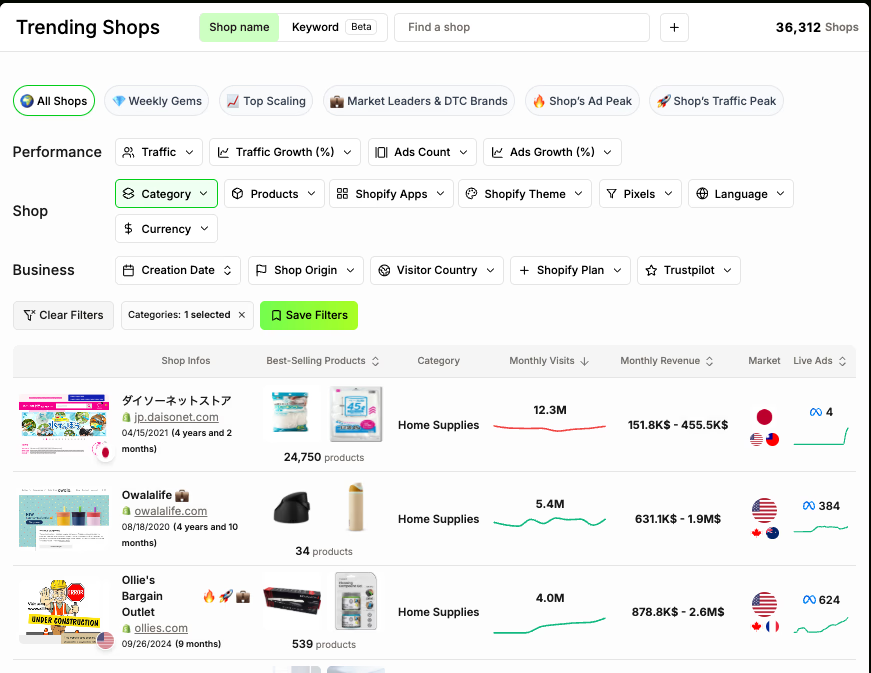
Their numbers show rising demand. This is a data-backed signal, not a guess. You can validate ideas by watching real businesses succeed in real time.
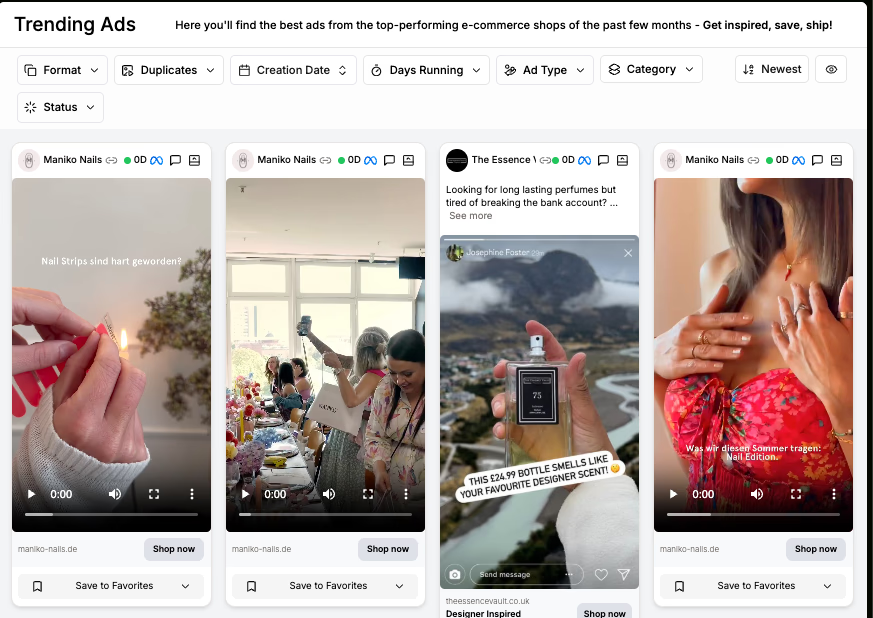
This proven marketing angle helps you craft your Amazon listing, A+ content, and PPC campaigns. You can ethically learn from the biggest DTC brands by analyzing their public data.
How to Spot Viral Trends by Tracking Your Competitors' High-Performing Ads
Finding a winning product is only half the equation. The real leverage comes from knowing how to position and market that product.
Big DTC brands spend thousands testing ads to see which hooks, visuals, and formats convert. Instead of guessing, you can reverse-engineer their learnings using Trendtrack.
Here’s how to do it.
Step 1: Browse the Trending Ads Dashboard
Navigate to the Trending Ads tab in Trendtrack’s sidebar. This is where you’ll find the most effective ads from the best-performing Shopify stores.
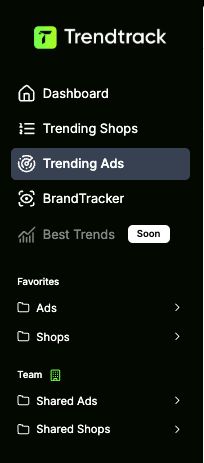
In the interface:
- Use filters to narrow by format, category, or days running.

- Watch for ads that have been live the longest. These are often the highest-converting.
- As an example, The Essence perfume ad uses bold captions like “This £24.99 bottle smells like your favourite designer scent.”. This signals strong ROAS.
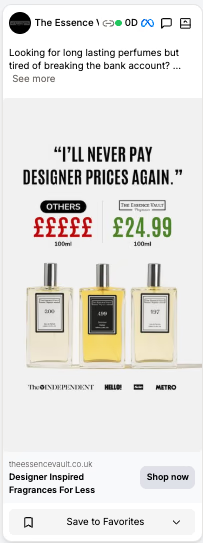
From a single screen, you can gather:
- Hook types ("I worked", "I’ll never pay designer prices again")
- Video style (UGC vs studio)
- Call-to-action phrasing ("Shop now", "Save to Favorites")
- Platform adaptation (look for the icons showing Meta, TikTok, Pinterest)
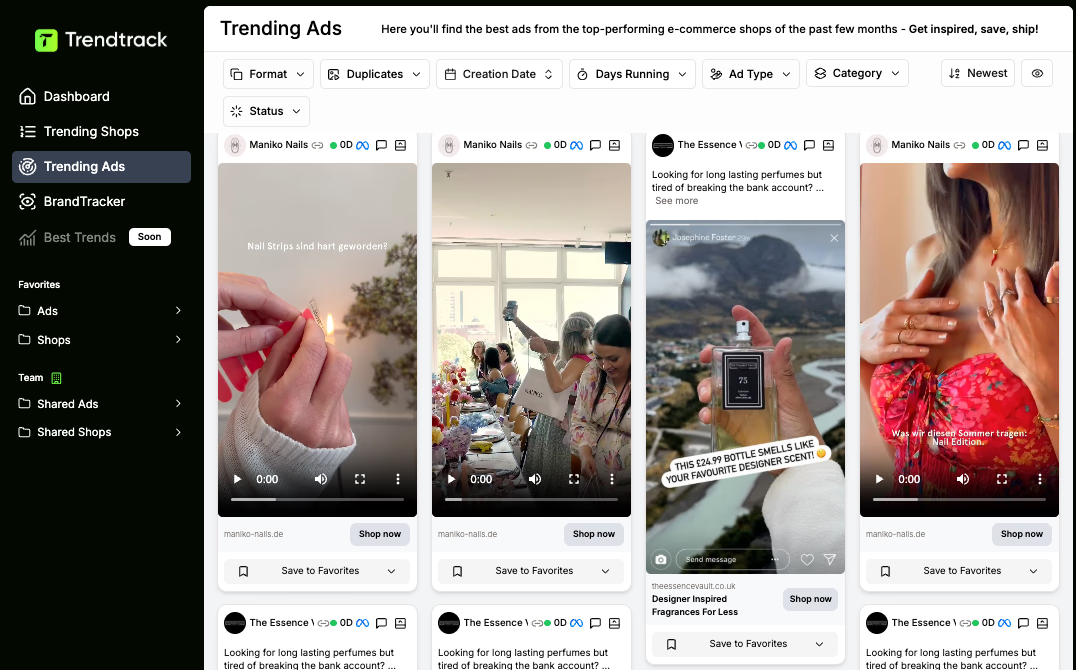
These clues help you understand what angle is resonating in real time. Whether it's affordability, exclusivity, or sensory experience.
Step 2: Dive into Specific Brands via BrandTracker
Once you spot a brand worth analyzing (e.g. Alo Yoga), click “Track in BrandTracker.” This takes you to a live dashboard with full visibility into their ad strategy.

From the BrandTracker page:
- See ad volume breakdown by format (videos, images, DCO).
Example: Alo Yoga runs 954 active ads, with over 92% being Dynamic Creative Optimization. It shows a heavy focus on automated testing.
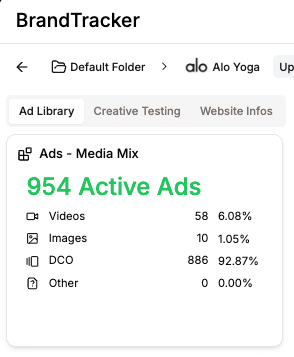
- Check the Top 10 ads sorted by engagement.
- Their top ads feature basics like socks. Implying they’re driving volume from repeat essentials, not just flashy drops.
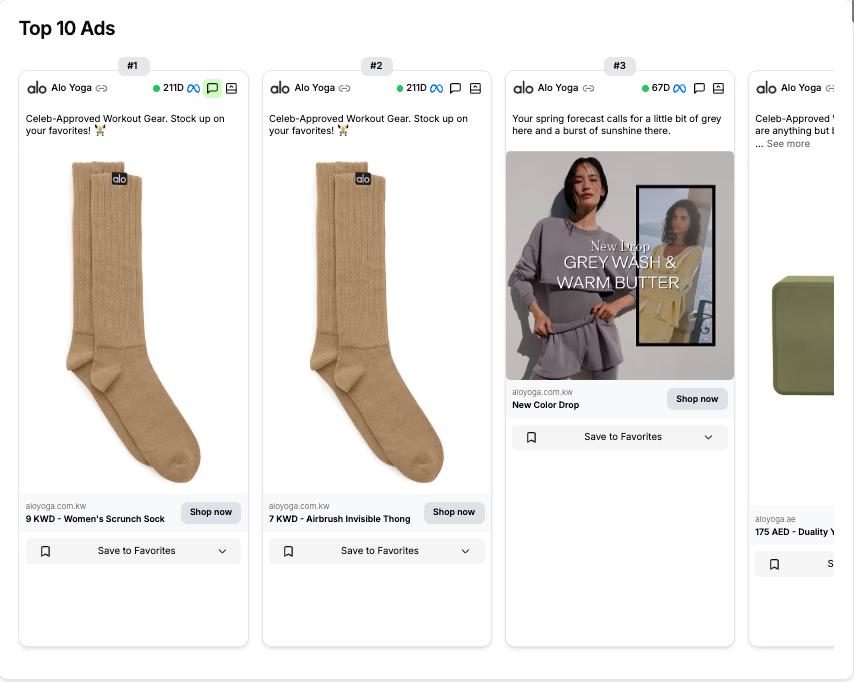
- View landing page URLs to understand how they structure post-click flows.
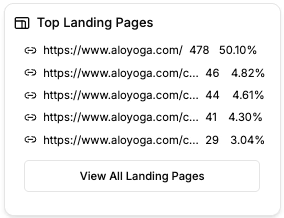
- Analyze ads launched over time to spot campaign bursts—such as new color drops or seasonal pushes.
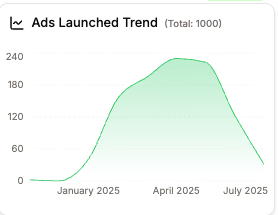
This kind of transparency lets you spot exact creative patterns brands double down on.
Step 3: Apply What Works to Your Own Brand or Listings
Let’s say you’re launching a similar athleisure product or a magnetic spice rack. After studying a high-performing ad from a Shopify store:
- Repurpose the hook: Use phrases that replicate the tone but not the exact copy.
- Match the energy: If it’s a fast-paced TikTok-style video, don’t respond with static images.
- Design listings and A+ content: Based on what’s proven to resonate in the ad.
This lets you craft better Amazon listings, improve Shopify product pages, and design smarter PPC ads—without guessing what works.
Join 10,000+ E-commerce Leaders
Thousands of successful e-commerce founders already use Trendtrack to spy, track, and scale their businesses. Don't get left behind.
Your Essential Toolkit for Amazon Product Research
Having a solid framework is important, but you need the right tools to act on it. Product research is like an intelligence mission—your success depends on the quality of your gear.
Some tools work like long-range scanners, picking up early signals from the wider world. Others are your on-the-ground kit, digging deep into Amazon’s marketplace. You need both to launch with confidence and real data.
Use Google Trends to Find the Best Product
Google Trends shows what people are actively searching for across Google platforms. It’s a simple way to validate product ideas, detect seasonality, and optimize keywords. Especially when selling on Amazon or Shopify.
Here’s how to do it:
1. Go to trends.google.com and Adjust Location and Time Range
Use the filters to select your target market and a relevant time frame (e.g., past 30 days).
- This shows if the product has seasonal spikes or consistent popularity.

Enter a product idea (e.g., "bamboo cutting board"). You’ll see a graph of search interest over time.
- A steady or rising trend suggests long-term demand.
- Flat or declining interest may mean the niche is saturated or fading.
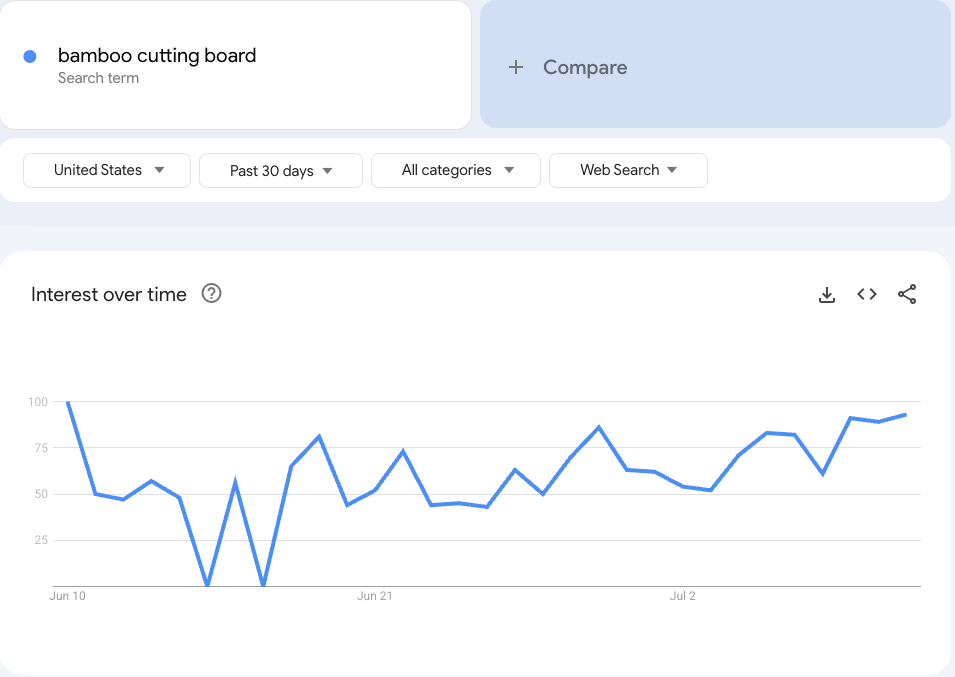
2. Compare Search Terms
Use the “Compare” feature to analyze keyword variations (e.g., “scoop” vs “spoon”).
- This helps you choose the right terms for your listings or ads, especially in non-English markets.
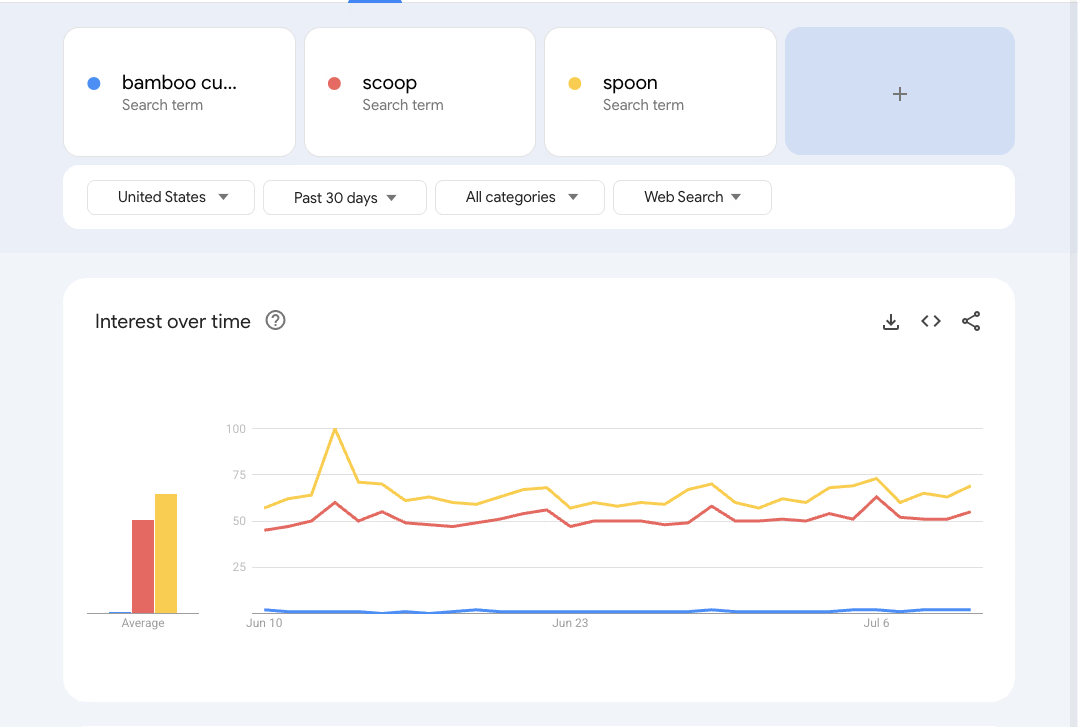
3. Explore Related Queries
Scroll down to see related topics and queries.
- These can inspire new angles for ads, bundles, or SEO keywords.
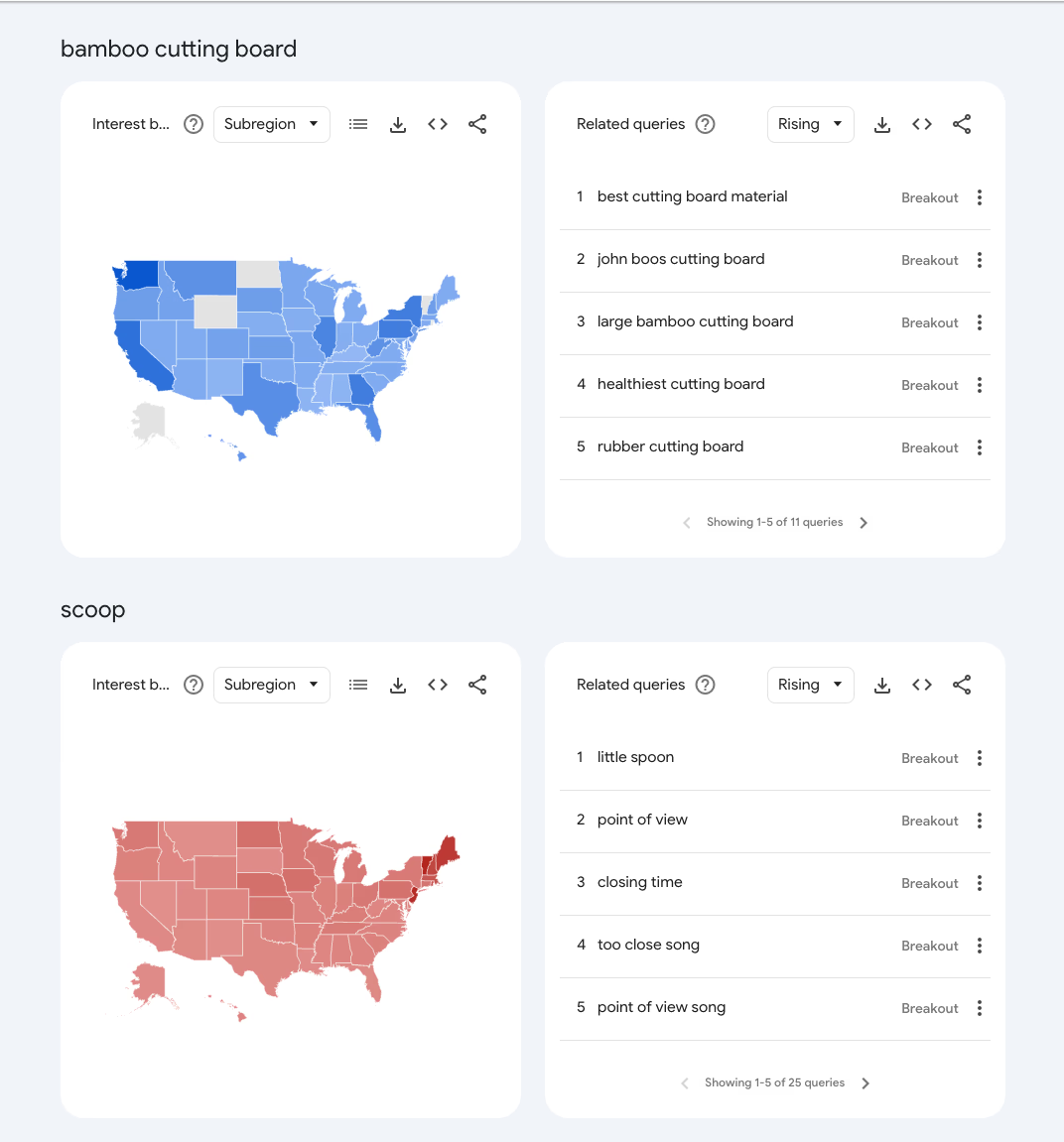
Google Trends is free, fast, and surprisingly powerful. Use it to validate demand before sourcing, plan your ad timing, and speak the language your buyers actually use. When combined with Trendtrack’s performance data, you get both sides of the story: search intent and market execution.
Stay Ahead of the Competition
In e-commerce, timing is everything. Spot emerging trends early and capitalize on them before the market gets saturated.
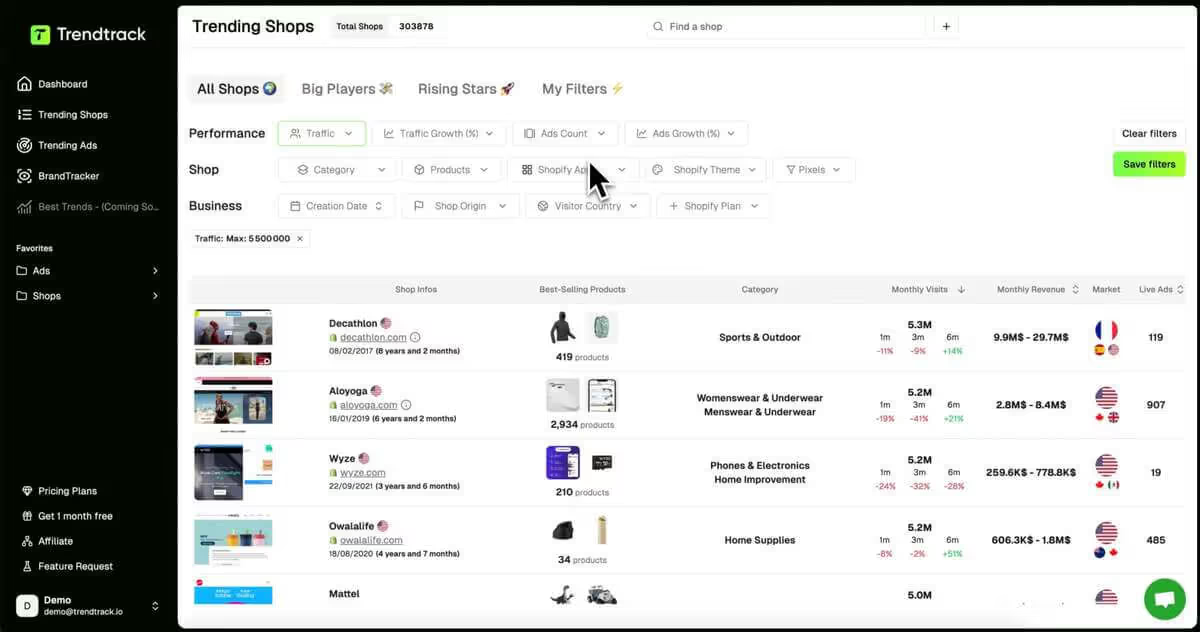
How to Use Amazon Analytical Tools: Helium 10, Jungle Scout, and DataHawk
If you’re selling on Amazon, using analytical tools isn’t optional. It’s how you make data-backed decisions about what to sell, how to price it, and how to compete. Here are three of the most popular platforms used by top sellers:
Helium 10
A full suite for Amazon sellers that covers keyword research, product tracking, listing optimization, and profitability.

Helium 10 is great for finding keyword gaps, spotting trends early, and auditing your own product listings for improvements.
How to use it:
- Use Black Box to search for product ideas based on demand, competition, and revenue.
- Use Cerebro to reverse-engineer your competitor’s keywords by entering their ASIN.
- Use Trendster to view historical performance of keywords or products.
Jungle Scout
One of the first Amazon research tools, focused on product discovery, sales estimates, and supplier sourcing.

Jungle Scout is especially strong for estimating real sales data and evaluating profitability at a glance.
How to use it:
- Use the Product Database to filter listings by category, price, reviews, and sales volume.
- Use the Opportunity Finder to spot underserved niches.
- Use Product Tracker to monitor sales velocity over time.
DataHawk
A performance analytics platform for advanced sellers and brands. Focuses on SEO, advertising data, and financial KPIs.

DataHawk is ideal if you’re managing multiple SKUs or want to optimize long-term brand performance on Amazon.
How to use it:
- Use the Keyword Rank Tracker to monitor how your listings rank over time.
- Analyze Share of Voice data to see how often your brand appears in top search results.
- Use Business Reports to break down profitability, spend, and conversion rates.
Whether you're launching your first listing or optimizing a brand portfolio, using Amazon analytics software takes the guesswork out of the process. It saves you from costly trial and error.
How to Validate Your Trending Product
You’ve spotted a trend and feel confident about your product idea. But excitement can cloud judgment. Before spending money, shift from trend hunter to careful analyst. This approach helps you validate an idea without guessing and build a business you can trust.
A Checklist for Evaluating Product Demand
Suppose your research highlights “portable blenders.” Google Trends shows steady growth, and you notice them on Shopify stores and TikTok. That’s a good start.
Next, check Amazon’s Best Sellers Rank (BSR) for similar products. A lower BSR means higher sales. If several portable blenders have a BSR under 20,000 in “Home & Kitchen,” demand is strong.
Demand attracts competition. Look at the number of customer reviews for top products. If leaders have over 10,000 reviews, the market is crowded and hard to enter. If top sellers have only a few hundred reviews, the market is still open. You can compete with a better product or smarter marketing.
Want to tap into viral product trends? Learn how to spot trending products on TikTok and discover items before they hit mainstream Amazon searches.
Calculating True Profitability
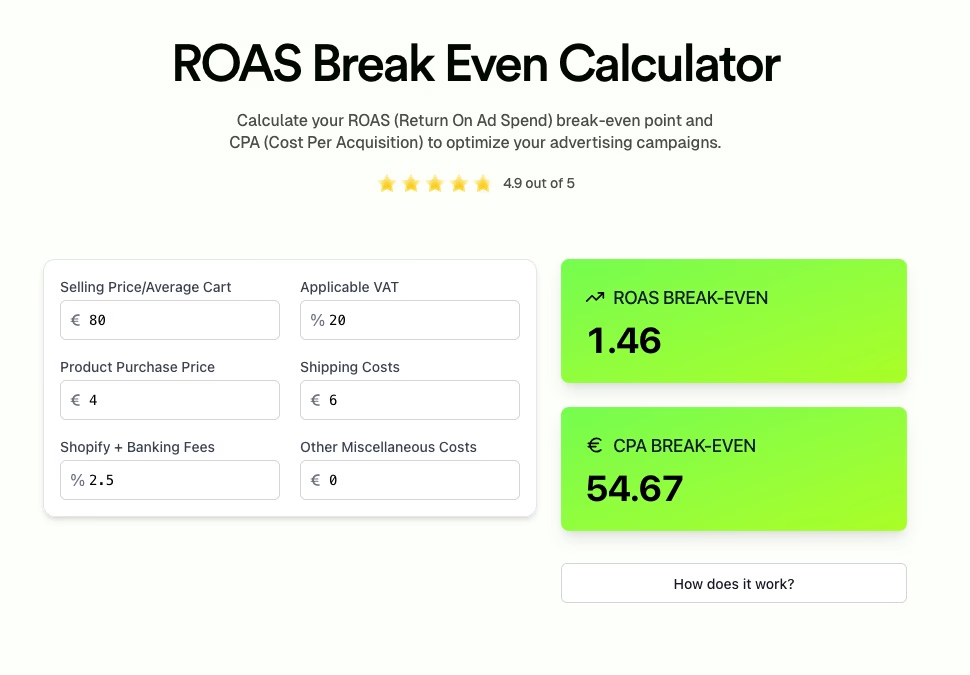
A product priced at $40 with a $10 sourcing cost seems profitable. But Amazon fees and other costs reduce your margin.
Consider these expenses:
- Amazon FBA fees for storage, packing, and shipping
- Shipping inventory to Amazon warehouses
- Advertising costs (PPC) to gain visibility
Use a profitability calculator to estimate your real margin. Your $30 margin might shrink to $7 after fees and ads. Decide if $7 per unit justifies the effort.
How to Avoid Overly Saturated or Problematic Products
Validation also means spotting warning signs. Review customer feedback, especially 1- to 3-star ratings. Look for common complaints like battery issues or leaks in portable blenders. These reveal product weaknesses.
This insight helps you avoid generic models and find suppliers who fix these problems, giving you a competitive edge.
Check for intellectual property risks. Ensure the product design and brand name are unique. A quick patent search can prevent legal troubles. Skipping this step risks losing your business later.
The Importance of Sustainability for Brand Longevity
A product’s story influences its success. Sustainability and ethical sourcing are essential for long-term growth.
Ask if your supplier uses recycled materials or follows fair labor practices. This approach builds a brand that stands out.
Ethically sourced products offer a compelling story for listings, ads, and packaging. While cheap products may bring quick sales, brands built on quality and integrity last longer. This strategy helps you create a sustainable eCommerce business.
Case Study: How to Spot What to Sell on Amazon in 2025 Using Trendtrack
Most sellers guess their way into product launches. Smart sellers track signals—ads, traffic, and brand behavior—to find trends before they hit saturation. Let’s walk through how Trendtrack can be used to go from “what should I sell?” to a validated product idea using real-time data.
Step 1: Spot High-Momentum Brands in the Trending Shops Feed
Start at Trendtrack’s Trending Shops section. This is where you’ll find Shopify stores that are seeing massive growth—either in traffic, ad activity, or sales.

- RejuvaCare.com has 61.1M monthly visits and is surging in health products.

- Gymshark.com is also trending again, with 913 live ads and strong ad growth—despite being a mature brand.

- The Animal Rescue Site shows sharp traffic growth with minimal ad activity. This could mean organic or viral product interest.

Focus on stores with a steep traffic curve (green line) or rapid ad expansion. That means they’re scaling something that’s working.
Step 2: Narrow Down Their Hero Products
Once you spot a growing brand, check the “Best-Selling Products” column.
Example:
- RejuvaCare is listing 395 products, but if you click into their store, you can see the few that are actually driving results.
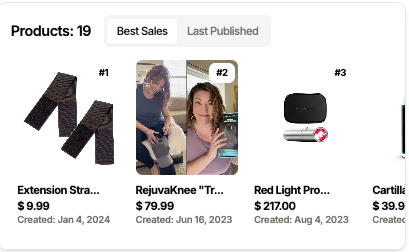
Gymshark has over 8,000 products. However, most ads highlight just a handful of seasonal apparel like shorts, oversized t-shirts, or scrunch leggings.
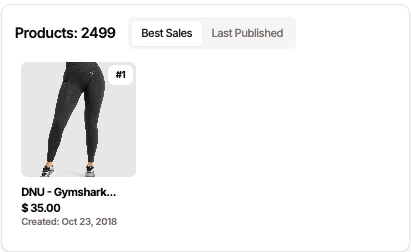
You’re not trying to copy the product directly—but to spot patterns:
- What categories are they pushing right now?
- Is it skincare? Sleepwear? Pet health supplements?
- Are products solving problems or hitting aesthetic/viral trends?
Step 3: Analyze What’s Driving Sales with Trending Ads
Now go to Trendtrack’s Trending Ads tab and filter by:

- Category (Health, Pets, etc.)
- Format (Video for UGC, or Image for DTC brands)
- Days Running (to find recent or evergreen winners)
Brands like Maniko Nails and The Essence are running UGC-style videos with before/after product reveals.
Ads with masked faces, hand application, and transformation sequences dominate. This shows "routine hacks" and "social proof" work well.
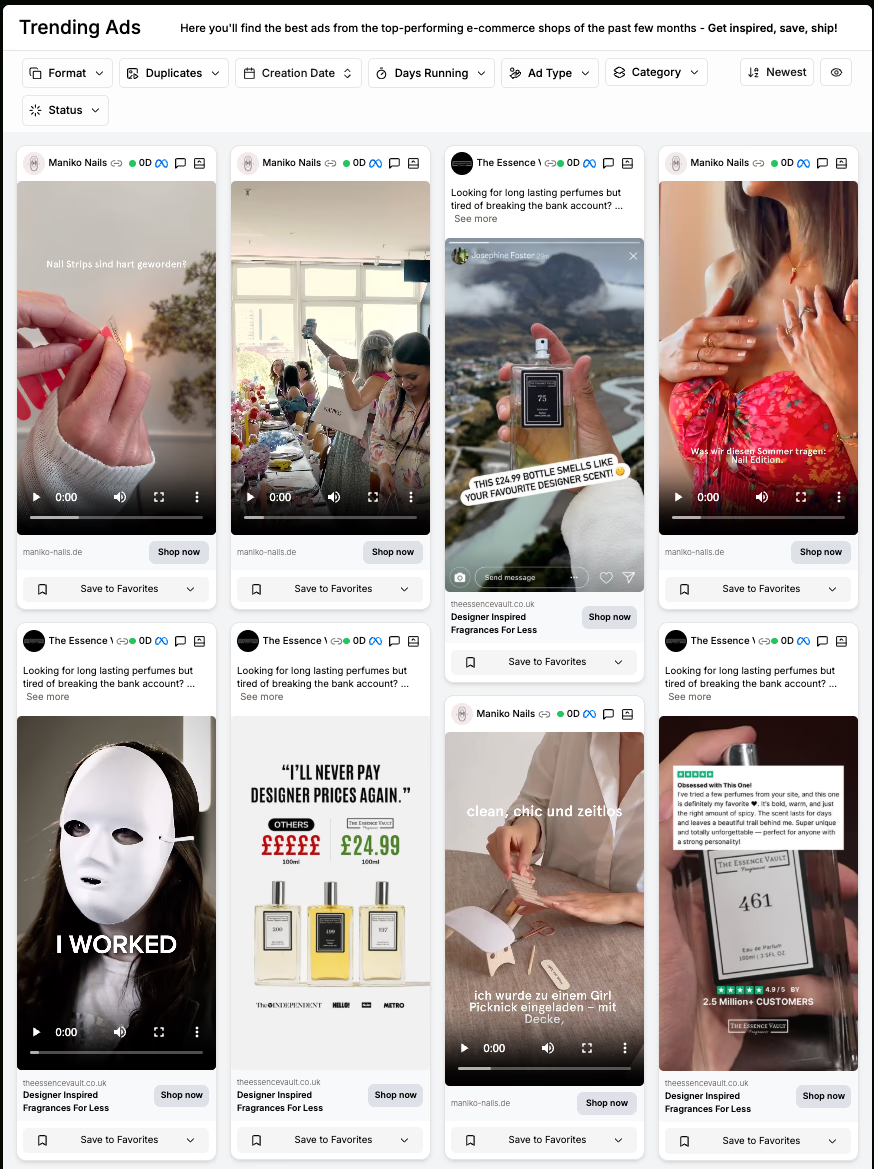
What to look for:
- What angle is the ad using? (E.g., “Save money,” “Declutter your space,” “Look better instantly”)
- Is the ad visual or copy-driven?
- How long has it been running? (Ads that have run for 20+ days and are still live = validated winners.)
Step 4: Dig Deeper with BrandTracker
Pick a brand that runs high ad volume and head to BrandTracker. This is where you can:

- See how many ads they’re testing
- Identify their top-performing creatives
- View landing pages and product page layouts
- Track launch timing by week or month
For example:
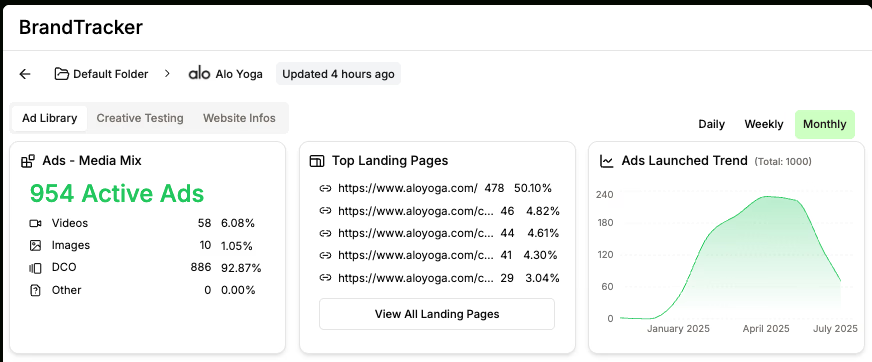
- Alo Yoga has 954 active ads, most of which are dynamic creative optimized (DCO)—meaning they’re testing variations automatically.
- Top ads are pushing simple accessories like socks or workout thongs—great entry SKUs.
- You can trace ad spikes in March–April, showing when they pushed traffic pre-summer.
Step 5: Answer “What Should I Sell?” with Evidence
By now, you should see:
- What categories are heating up (e.g., health, pets, minimal home gadgets)
- Which types of products are getting ad dollars
- Which messages or visuals are working
Ask yourself:
- Is this product in a category I understand or can source easily?
- Does it solve a problem, look good on camera, or fit a seasonal trend?
- Can I sell it cheaper, faster, or bundled smarter than current listings?
You’re not copying. You’re reverse-engineering success. Using Trendtrack gives you a great advantage because you’re not guessing what people want. You’re tracking what’s working right now at the top of the Shopify ecosystem and translating it into Amazon or DTC strategy.
Launch Your Amazon Success Story Today
Finding trending products to sell on Amazon doesn't have to feel like searching the impossible. Combine the right tools with strategic thinking.
Use platforms like Trendtrack.io to spot emerging trends early. Validate the demand through Amazon's native data, and use proven research tools to analyze competition. You're positioning yourself to capture market opportunities before they become oversaturated.
Skyrocket Your E-commerce Growth
Access data-driven insights to supercharge your Shopify sales and dominate your niche effortlessly.

Discover What Sells Online
Uncover winning products and strategies before your competitors do. Trendtrack gives you access to 10,000+ trending Shopify stores and high-performing ads in one intuitive platform.
Join 10,000+ E-commerce Leaders
Thousands of successful e-commerce founders already use Trendtrack to spy, track, and scale their businesses.

Install Our Free Chrome Extension
Analyze any Shopify store you visit with our powerful browser extension. Get instant insights on traffic sources, visitor volume, themes, and apps.

Your All-in-One E-commerce Intelligence Tool

Check out our Youtube Channel
Magna est culpa labore nisi officia veniam aliqua. Pariatur occaecat sint ut deserunt culpa aute magna consectetur.
.avif)




Are you ready to get the insights?
From viral trends to million-dollar stores — unlock the insights behind what sells, scales, and converts. All in one place.




